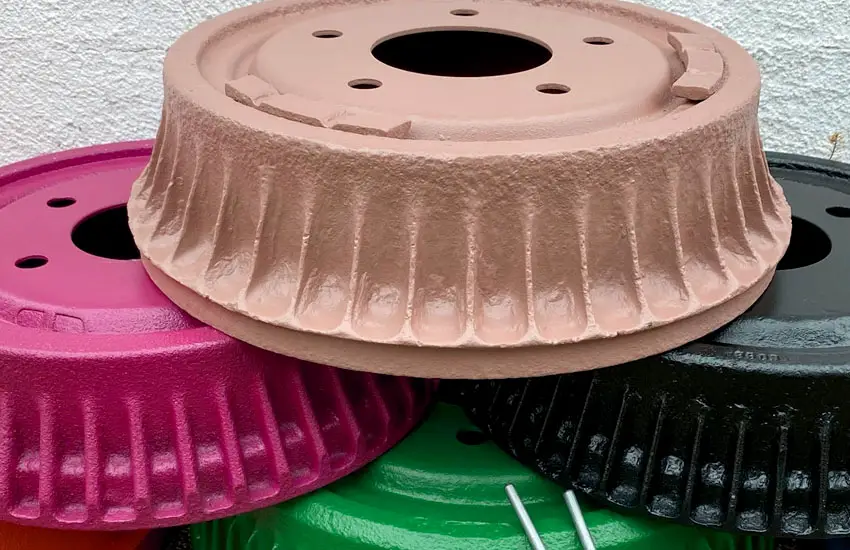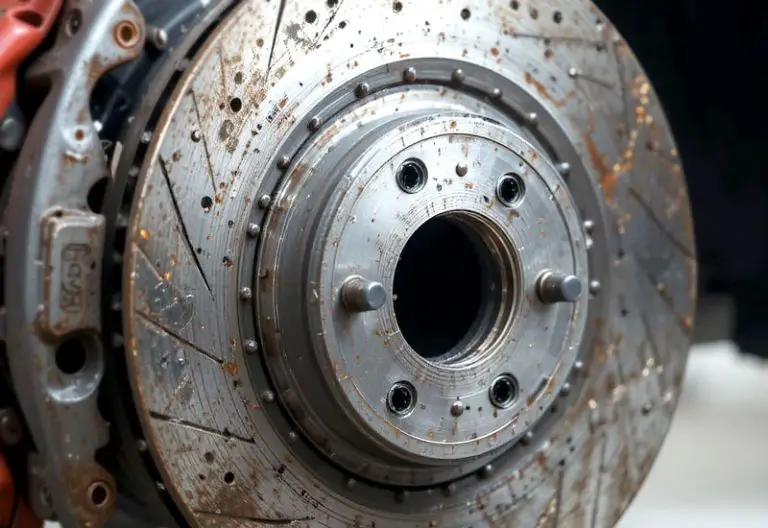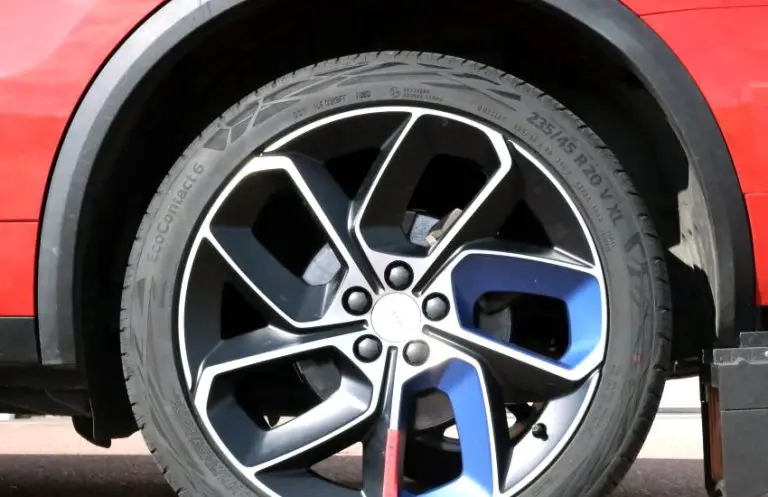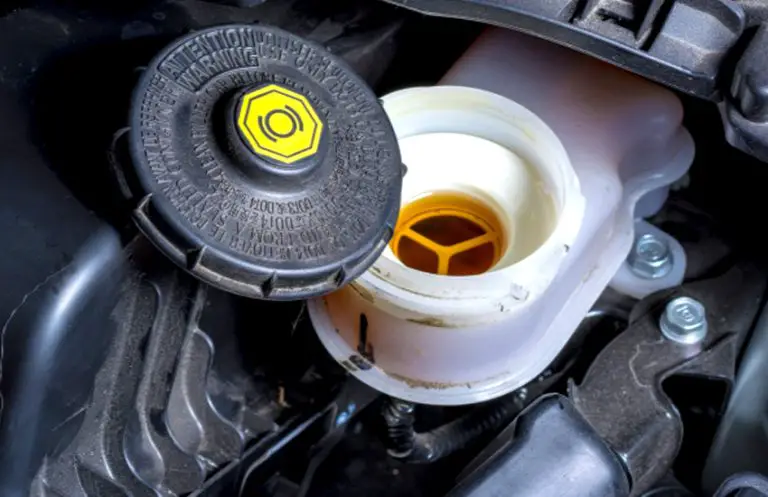When you press the brake pedal in your car, you expect it to respond smoothly and efficiently, bringing you to a safe stop. But what happens when that smooth braking experience turns into a vibration or a shudder? In many cases, the culprit can be a warped brake drum.
Brake drums are essential components in your vehicle’s braking system, particularly in older cars or those with drum brakes on the rear axle. These parts work by using friction to slow down or stop the vehicle. However, they are not invincible, and over time, they can become damaged, worn out, or even warped.
This phenomenon is not only inconvenient but can also be dangerous if left unchecked. So, can brake drums actually become warped, and if so, how does that affect your driving experience? Let’s explore the details and uncover why this issue happens, how to identify it, and what you can do about it.

What Causes Brake Drums to Become Warped?
Brake drums, though built to last, are subjected to intense heat and pressure every time you use your vehicle’s braking system. The process of braking generates a lot of heat, especially in situations where the vehicle is used frequently, or where there are heavy braking demands. Over time, this excessive heat can cause the metal of the brake drum to expand and contract. When this occurs repeatedly, it can eventually lead to the warping of the brake drum.
Heat and Stress on Brake Drums
Every time you apply the brakes, friction is created between the brake shoes and the brake drum. This friction is what slows the vehicle down, but it also generates heat. Under normal circumstances, the heat dissipates quickly as the brake system cools down. However, if the brakes are used excessively (such as during long descents or when driving with a heavy load), the heat may not have enough time to escape, which can result in the brake drum overheating.
Overheating occurs when the brake system becomes unable to dissipate heat at the same rate it is being produced. This can lead to thermal expansion, which, over time, causes uneven wear and stress on the brake drum. If the heat and pressure continue to build up without proper cooling, the brake drum can warp. This warping results in the drum becoming misshapen and uneven, affecting the performance of the brake system.
The Role of Brake Shoes in the Warping Process
Another factor that contributes to brake drum warping is the brake shoes. Brake shoes are designed to press against the inner surface of the brake drum, providing the friction necessary to slow the vehicle. Over time, brake shoes can wear unevenly, especially if they are not maintained properly. When brake shoes become worn out or unevenly placed, they can create inconsistent friction against the brake drum.
This inconsistency in the contact surface can lead to uneven heating across the brake drum. As a result, parts of the drum may be exposed to more heat than others, causing them to expand and contract at different rates. Over time, this can contribute to warping, making the drum less effective at stopping the vehicle.
Excessive or Uneven Braking
Another factor that can lead to warped brake drums is excessive or uneven braking. If you tend to ride the brakes or brake too hard, you create more heat than necessary. This can put extra stress on the brake drums, leading to potential warping. Additionally, if the brake shoes are not adjusted properly or there is an issue with the brake system’s hydraulics, uneven braking can occur, leading to areas of the drum being subjected to more force than others. Over time, this can cause the brake drum to become warped.
Driving Conditions
The driving conditions you regularly encounter can also impact the likelihood of brake drum warping. For example, driving in mountainous areas where you have to brake frequently due to long downhills can cause your brake drums to overheat. Similarly, if you are frequently hauling heavy loads or towing, this can place extra strain on the brake system, increasing the chances of warping. Stop-and-go city driving, where you frequently apply the brakes, can also lead to a build-up of heat in the brake drums, raising the potential for warping.
In short, brake drums become warped primarily due to excessive heat caused by repeated braking, driving conditions, and poor maintenance. These factors work together to cause the metal of the brake drum to deform and become uneven. Once warped, the brake drum can affect the entire braking system’s performance, leading to a range of issues for the driver.
How to Identify Warped Brake Drums
If your brake drums have become warped, you will likely notice a few signs that indicate something is wrong with your braking system. These signs can range from minor vibrations to more serious safety issues. Below are some common symptoms of warped brake drums:
Vibration or Pulsation in the Brake Pedal
One of the most common signs of warped brake drums is a vibration or pulsation in the brake pedal when you apply the brakes. This happens because the warped areas of the brake drum are not making even contact with the brake shoes. As a result, the pressure applied by the brake shoes fluctuates, causing the brake pedal to vibrate. This vibration can sometimes be subtle but may become more noticeable as the warping worsens.
Unusual Sounds During Braking
Another sign of warped brake drums is unusual noises during braking. You might hear a grinding or squealing sound when you apply the brakes. This could be a sign that the brake shoes are not making proper contact with the drum due to its uneven surface. If the warping is severe enough, the brake shoes could also be scraping against the drum, leading to additional noise.
Pulling to One Side
If your car pulls to one side when you brake, it could indicate that the brake drums are warped. When the brake drum is uneven, it may cause uneven braking pressure on the wheels. This results in the car pulling toward the side with the worst brake performance. If this issue occurs consistently when braking, it’s likely a sign that the brake drum is warped and needs attention.
Increased Stopping Distance
Warped brake drums can also affect the overall braking performance of your vehicle. Since the brake shoes are not making proper contact with the drum, the braking power is diminished. As a result, your vehicle may take longer to come to a stop than it would with properly functioning brakes. This can be dangerous, especially in emergency situations where quick stopping is essential.
Heat and Burning Smells
If you notice a burning smell after driving, it could be due to overheated brake components. When brake drums are warped, they are more prone to excessive heat buildup. If the brake system gets too hot, you may experience a burning odor coming from the brakes, indicating that the system is under stress.
Visible Damage or Uneven Wear
In some cases, you might be able to visually inspect the brake drums for damage or uneven wear. If the surface of the brake drum looks uneven or there are visible grooves, it could be a sign of warping. This is usually visible when the drum is removed during a routine brake inspection. If the damage is severe, it may be necessary to replace the brake drum entirely.
If you notice any of these symptoms, it’s important to have your brake system inspected by a professional mechanic as soon as possible. Warped brake drums can lead to decreased braking performance, which can be dangerous for both you and other drivers on the road.
What to Do if Your Brake Drums Are Warped
If you suspect that your brake drums are warped, there are a few steps you should take to address the issue. Below are some options for fixing warped brake drums and ensuring that your vehicle’s braking system is functioning properly.
1. Have Your Brake System Inspected
The first step is to have a professional mechanic inspect your brake system. They will remove the brake drums and examine them for signs of warping or damage. If the warping is minimal, the mechanic may be able to resurface the brake drum, which involves smoothing out the surface to restore its evenness. However, if the warping is too severe or the drum is cracked, it may need to be replaced.
2. Resurface the Brake Drums
If the warping is not too extreme, your mechanic may recommend resurfacing the brake drums. This process involves using a lathe to smooth out the surface of the drum, restoring its original shape. Resurfacing can correct minor warping and extend the life of the brake drum. However, resurfacing has limits, and if the drum is too thin or damaged, it may need to be replaced entirely.
3. Replace the Brake Drums
If the brake drums are severely warped or damaged, the only option may be to replace them. Brake drums are not overly expensive, but replacing them can be a time-consuming and labor-intensive process. However, it is crucial to replace damaged brake drums to ensure that the braking system functions properly and safely.
4. Replace the Brake Shoes
If the brake shoes are worn unevenly or damaged, it’s also a good idea to replace them when you replace or resurface the brake drums. Worn brake shoes can exacerbate the issue of warping, so replacing them at the same time ensures that the new drums and shoes work together to provide optimal braking performance.
5. Regular Maintenance
To prevent brake drums from warping in the future, it’s essential to practice regular brake maintenance. This includes getting your brake system inspected regularly, especially if you notice any signs of performance issues. Keeping the brake system clean, ensuring proper brake shoe adjustment, and avoiding excessive braking can help extend the life of your brake drums and prevent warping.
Are These Questions in Your Mind?
Is it possible for brake drums to become warped?
Yes, brake drums can become warped due to excessive heat buildup, uneven wear, and stress on the brake system. This happens when the metal of the drum deforms due to thermal expansion from repeated braking.
Can warped brake drums affect braking performance?
Yes, warped brake drums can lead to decreased braking efficiency, causing vibrations, longer stopping distances, and reduced overall safety.
Is it dangerous to drive with warped brake drums?
Yes, driving with warped brake drums is dangerous because it compromises braking performance, which can lead to longer stopping distances and even brake failure in extreme cases.
Can I resurface my warped brake drums instead of replacing them?
Yes, if the warping is minor, resurfacing can correct the issue. However, if the warping is severe, it may be necessary to replace the brake drums entirely.
Is it costly to replace brake drums?
Replacing brake drums is typically not very expensive, but the labor involved in removing and installing them can add to the overall cost. Prices can vary based on the make and model of your vehicle.
Can worn-out brake shoes cause brake drums to warp?
Yes, worn-out or uneven brake shoes can contribute to uneven braking pressure, which can lead to brake drum warping over time.
Do I need to replace both brake drums at the same time?
While it’s not strictly necessary, it is recommended to replace both brake drums if one is damaged. Replacing both ensures balanced braking performance.
Is it possible to identify warped brake drums during a routine inspection?
Yes, a mechanic can check for warped brake drums during a routine brake inspection. They will look for visible signs of wear and may measure the drum for evenness.
Can driving conditions affect brake drum wear?
Yes, driving in hilly or mountainous areas, towing heavy loads, or frequent stop-and-go driving can all increase wear on the brake system and contribute to brake drum warping.
Do I need to replace my brake drums if I hear noise while braking?
If you hear unusual noises such as grinding or squealing, it could be a sign of warped brake drums, and you should have your brake system inspected immediately to prevent further damage.


